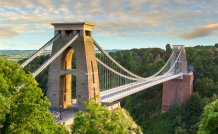
Recently-released local records show some members of the community in Bristol made strong demands for a public inquiry
St Pauls inquiry could have prevented 1981 riots, research suggests
A full public inquiry into the 1980 Bristol riots could have prevented similar widespread violence which took place around Britain a year later, a new study suggests.
Politicians refused permission for an open investigation into the disorder that broke out in the St Pauls area of the city when police raided a café popular with local black people.
University of Exeter research has found this left community concerns unaddressed and may have inspired riots in the spring of 1981 in London, and later in Birmingham, Manchester, Leeds and Liverpool.
Mirroring current debates regarding the Grenfell Tower fire, recently-released local records show some members of the community in Bristol made strong demands for a public inquiry into the anti-police disturbances in St Pauls because they were frustrated by being unable to express their views about what had happened.
They later told officials they believed an inquiry in Bristol could have stopped the spread of violence around the UK the following year.
Others suggested that a lack of punishment given to those involved in the St Pauls’ riot had “emboldened” people living in other parts of the country, and made them think they could tactically defeat the police.
Police working during riots in Lewisham and Brixton reported that crowds shouted “Remember Bristol!” whilst charging police lines. South London graffiti said: “Bristol now, Brixton next?” and “Bristol yesterday, Brixton today”.
Home Secretary Willie Whitelaw, who refused to run a public inquiry after the St Pauls riot, denied that this decision had been a mistake and said he had followed a different policy for London and other parts of the UK because the disturbances were: “far wider and of far more depth”. This inquiry, led by Lord Leslie Scarman, notably rejected accusations that the police were institutionally racist and advocated the continuation of “hard policing” tactics where necessary.
Historian Dr Simon Peplow, from the University of Exeter, examined local records at the Bristol Records Office and records at the National Archives, recently available due to the 30-years rule on the public release of records, as well as conducting interviews with those who were involved at the time.
Dr Peplow, whose research is published in the journal Twentieth Century British History, said: “Rather than admit possible connections between events, Mr Whitelaw claimed Brixton was a very different situation. But the fact that people taking part in disorders in other areas shouted about Bristol showed that St Pauls took on a particular significance.
“The records show some members of the local community wanted a public inquiry because they felt marginalised and couldn’t see another democratic way of registering their complaints. However, others conversely believed that any governmental inquiry would be a ‘whitewash’.”
After the St Pauls riot, police and local groups worked to improve community relations. Whilst the police “swamped” Brixton after initial disturbances, in St Pauls officers chose not to patrol prominently in the area, and were praised for attempts to “join in the festive spirit” during the St Pauls festival.
Dr Peplow said: “This changed approach to policing, as well as community liaisons, could go some way to explaining why Bristol, in 1981, remained peaceful. But the lack of effective response or inquiry into the disorder further intensified the discontentment of black people nationwide, and many were increasingly willing to engage in collective violence.”
Twelve of those involved in the St Pauls riots went on trial in February 1981 under the serious charge of “riotous assembly”. The court case lasted six weeks and cost an estimated £500,000, the same cost as riot damage. Eight defendants were acquitted and the jury was deadlocked on the remainder. The trial was criticised for being a waste of time and money, and for its use of charges relating to “riotous assembly”, which were difficult to prove.
The documents examined by Dr Peplow show the demands for a public inquiry mainly came from community workers and older generations of black people. They were in favour of using official methods to put pressure on politicians to respond appropriately to the causes of the riot. The younger generation, who were more likely to have been involved in the disorder, thought a public inquiry would be a diversion or waste of time. Others were worried an inquiry would politicise the situation and give radical groups an outlet to push their agendas. This may explain why a protest march organised by left-wing Labour supporters was cancelled, due to a lack of numbers. The TUC set up its own inquiry into what happened at St Pauls but only around fifty people, around half of whom were black, gave evidence.
Mr Whitelaw privately told the Cabinet he believed “an inquiry would be undesirable” as “the police would be pilloried to no good purpose”. Instead, he ordered that senior government officials should examine “thoroughly and urgently” existing arrangements for handling spontaneous public disorder.
Mr Whitelaw also announced that the Race Relations and Immigration Sub-Committee of the Home Affairs Select Committee would undertake an inquiry into racial disadvantage. The committee had already embarked on this work, and did not examine the situation in Bristol in detail, only allowing witnesses to give brief oral evidence based on questions they were asked.
Date: 20 September 2017
